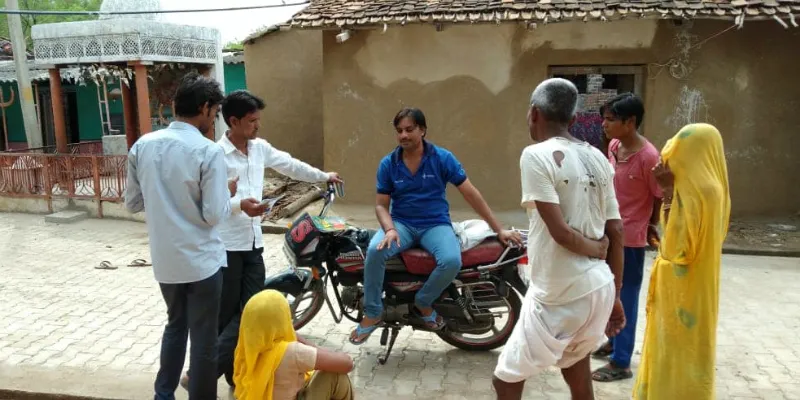How this Kota-based healthtech startup grew more than three times in just seven months by serving rural India
Healthtech startup Medcords has, till date, covered nine lakh people from 2,300 villages across four districts in Rajasthan and digitised their health records.It uses tie-ups with medical stores to enable villagers to consult doctors sitting far away from them, saving time and money.
When Shreyans Mehta started Medcords in 2017, little did he know that he would have to deal with saas-bahu shenanigans and other domestic drama. Since he set up the healthtech startup to make healthcare easily accessible to the rural and semi-urban populations of India, Shreyans has had to don multiple hats at once.

A Medcords representative educating the villagers about the benefits of the tech platform.
“Working in the villages is an experience unlike any. You just cannot assume you have done your bit and move away. We have to give a patient hearing to all the issues of the villagers,” he says. And this includes listening to their domestic disputes as well.
With their basic premise of making healthcare easy and accessible to the villagers, Medcords saves villagers the money and time to travel to hospitals, which are usually far from their villages. Through its tie-ups with local medical stores in and around the villages, which it calls ‘sehat sathis’ or health champions, Medcords enables villagers to consult doctors sitting far away from them, saving them money and time.
Growing daily
The startup till date has covered nine lakh people from 2,300 villages across four districts in Rajasthan, including Kota, Bhilwara, Tonk, and Jhalawar. And Shreyans says they are adding 5,000 new people daily on their platform.
Last year, the startup raised around $1 million from WaterBridge and Infoedge and is looking to raise the next round to scale up its operations to reach out to more than five crore people in the next three years.
Twenty-nine-year-old Shreyans, a BTech from MIT Manipal, started Medcords along with his co-founders Nikhil Baheti, a BTech in Computer Science from Bits Pilani, and Saida Dhanavath, an MTech in computer science from IIT-Mumbai.
“We want to become the most trusted healthcare platform for Bharat. Two years before starting, we travelled more than 75,000 km in the villages of Rajasthan, UP, MP, and Bihar. We met around 35,000 people and visited around 300 hospitals in the semi-rural and urban areas of these states,” says Shreyans.
They were on a quest to figure out how they could use technology to bring the rural patients closer to doctors, considering the ratio of doctors and patients in rural areas is so skewed.
Watch Shreyans talk about how he started Medcords:
“Around 80 percent of people in India live in the villages and more than 80 percent of doctors work out of cities and towns. The travelling cost of someone coming from villages to towns is more than the consultation fee of the doctors, which is an irony,” Shreyans says.
Typically, villagers end up shelling out Rs 800 to Rs 1,000 to travel to the nearest hospitals and hence avoid going to a qualified doctor unless the situation is critical. For smaller ailments, they often fall prey to village quacks.
Bridging the gap
Shreyans’ travels in the interiors of the country provided more insights into the inadequate and broken healthcare system in rural India.
Villagers are unable to keep track of their prescriptions or medical records. These are either lost or torn. There was no way a doctor could study the history of their treatment. They have to then undergo the tests etc again and all this increases their cost of treatment.
“So the first thing we asked them was what if we could help you store your prescriptions; will that be helpful? We received a good response for that,” Shreyans says.
“Our initial focus was that. We made 7.5 lakh people’s health records digital. Our premise was that once this is done, this can be the infrastructural layer on top of which we can get them consultation from the doctors.”

Villagers at a briefing session by Medcords.
Here’s how the Medrecords’ business model works. The startup focuses only on patients who pay a nominal amount for the service. The ‘sehat sathis’ or medical stores help these patients get better health services from their store through telemedicine. In return, they get to earn 25 to 30 percent more as the startup has a revenue-sharing model with them.
“This not only creates more revenue for the medical stores and pharmacies in the area, but it also makes the ‘sehat sathis’ local heroes as they become digitally savvy and help out villagers not only with consultations using telemedicine but also with any other query regarding the Medcords app,” Shreyans says.
Watch Shreyans talk about the milestones in the startup's journey:
The startup has approximately 800 ‘sehat sathis’ and 10,000 calls are received at its call centres on a monthly basis. “Our customers feel if they have any queries regarding health they can come to us as we have been able to build that trust with them,” Shreyans says . Thus, they took it in their stride when a distraught daughter-in-law called them saying her mother-in-law had consumed poison after a fight at home and helped the family out with the right treatment advice.
Healthcare in India
A YourStory 2018 Tech 30 Startup, Medcords was also one of the five startups to win the WhatsApp-Startup India Grand Challenge in June 2019, and was awarded $50,000.
“Our growth has been staggering. We are in places where you will not even find a bus stop in a 10 km radius. We are giving patients in these remote areas access to the best doctors at 80 percent of the cost, as the cost of commuting has come down. Our target is to serve five crore people in the next three years. In the next 18 months our focus will be on Hindi-speaking states,” Shreyans says.
Despite the booming healthcare market, which is expected to grow to $372 billion by 2022, India is woefully inadequate in providing low-cost, easy access to healthcare, especially in its rural areas.
But with increased internet penetration in India -- the internet user base has exceeded the 500 million mark and is likely to reach 627 million by the end of 2019, according to the Kantar IMRB ICUBE report -- technology is expected to bridge this gap.
And that’s the reason that the healthtech sector has continued to receive special attention from investors. In 2018, around $510 million was invested in 80 healthtech startups, including heavyweights like PharmEasy, CureFit, Netmeds, and others.
Anup Jain, Managing Partner, Orios Venture Partners, expects that in 2019 he will see more startups that will solve problems of the next 300 million consumers who live beyond the top six cities. Orios’s portfolio includes PharmEasy and LetsMD, and the venture fund continues to keep a keen eye on this sector.
In an earlier interview with YourStory, Anup said, “Sectors that let large sections of the population access better lending terms, healthcare, and education to improve their lives can become larger businesses than any that we have listed on bourses today. All of this has to be done with a mix of technology and offline methods and will require deep belief from investors and entrepreneurs alike. I expect bigger and more charismatic founders taking center stage in 2019.”
Together with the government’s new healthcare schemes like Ayushman Bharat, this spells good news for startups like Medcords which are using technologies such as analytics, and mobile and wearable devices to build solutions for Bharat.
Back-breaking challenges
After being selected in the prestigious Tech30 list of startups at YourStory’s TechSparks last year, Shreyans says they have witnessed 3.5X growth. “At that time, we were 2.5 lakh users. After seven, eight months, we grew to nearly 9 lakh users,” he adds.
Of course, this feat has not been without its back-breaking challenges. Medcords’ operations office is located in Kota but they continue to have hiring issues.
Watch Shreyans talk about the challenges the startup faces:
“The work that we are doing requires people to have a passion for it. Unless that is there, they will not be able to bear the difficult travel to the remote villages where there are no proper roads or electricity and the weather is so hot in the summer months. This time it touched nearly 51 degrees Celsius,” Shreyans says.
Their tech team sits out of Pune as it is easy to hire tech talent there. They also have a call centre in Kota that is manned by an all-women crew. “We felt it is better that women take calls from users as many women users may not be comfortable talking to men about their health concerns.”
From the nine lakh users they have in the four districts, seven lakh are, in fact, just from two districts. “So around 30-25 percent of the population of these districts that do not know how to operate a smartphone, for them, health means Medcords,” he says.
Trust and goodwill
The user acquisition is through the ‘sehat sathis’ or medical stores and through the kiosks which have been set up at the hospitals. “At the hospital kiosks, we start by digitising their medical records and prescriptions. Though they may not understand how the tech works, they know that their prescriptions are safe, and the next time they go to the doctor they just share their phone number and the doctor can access their previous records,” Shreyans says.
Today, the amount of goodwill and trust that the startup has earned can be seen in the way villagers treat them. “Many patients have started sending us sweets if they’ve had a good recovery. That is the level of trust we have created among the village folk. Initially, they were wary of trusting any new thing, thinking they may get cheated. But now that the trust is created, we are growing very fast,” Shreyans adds.
That’s probably one of the reasons there has been an 8X growth on the total revisit count as well on the platform, he claims.
Repeat users are a sure sign about the stickiness of their solution and with its growth plans in place, Medcords hopes to scale new heights.
(Edited by Teja Lele Desai)




![[RESEARCH] Indian startup funding in H1 2019: YourStory Research unveils two in-depth reports o...](https://images.yourstory.com/cs/2/f0816300-2d6c-11e9-aa97-9329348d4c3e/Combined_Featured_image-011563964649261.png?fm=png&auto=format&h=100&w=100&crop=entropy&fit=crop)




